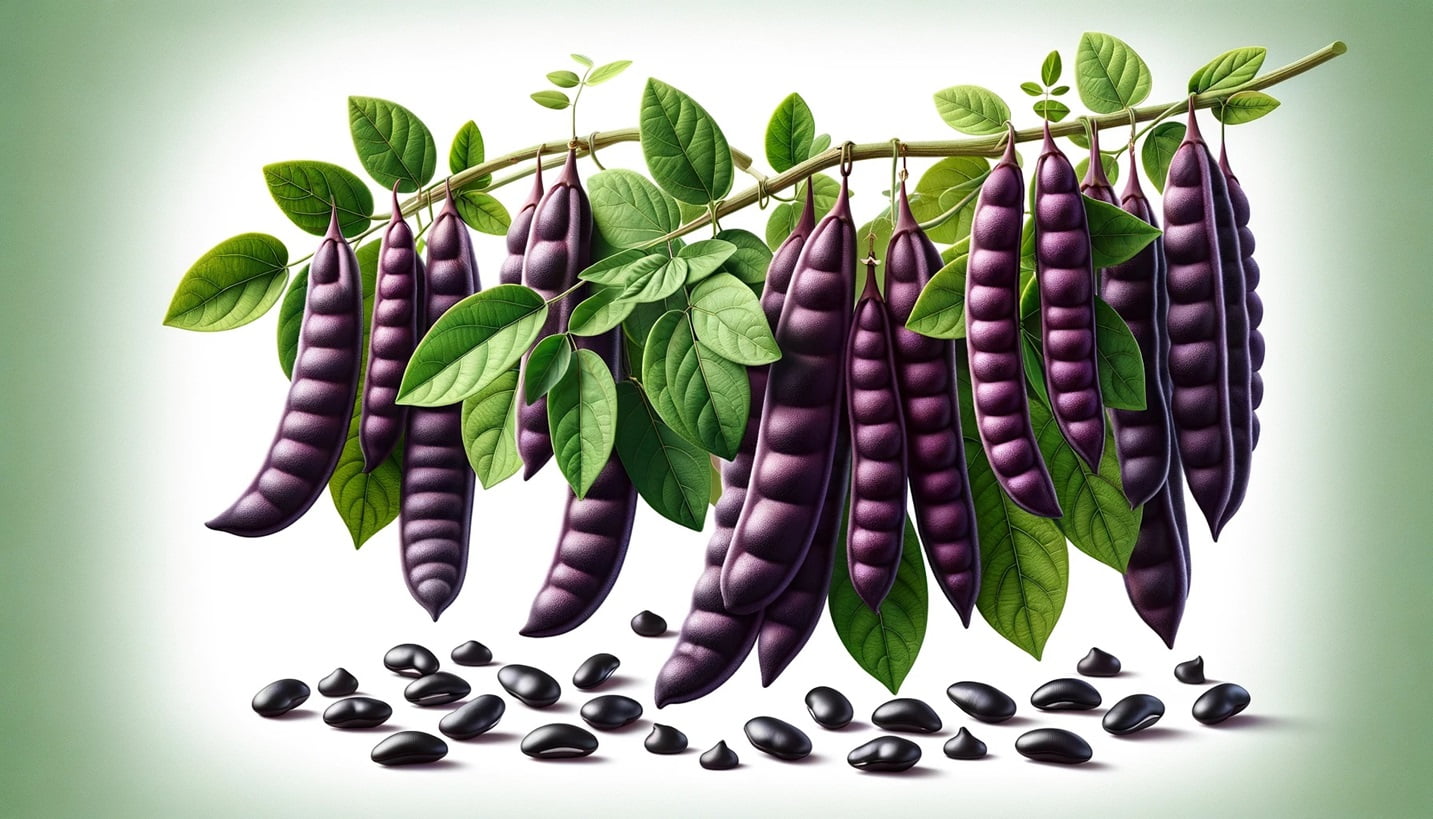
Mucuna pruriens stands as a tropical legume containing one of nature’s richest sources of L-DOPA, a precursor to dopamine that crosses the blood-brain barrier.
Mucuna pruriens delivers multiple cognitive benefits by enhancing brain function, improving mood regulation, and reducing stress levels through its impact on dopamine production and antioxidant properties.
Mucuna pruriens serves as both a nootropic supplement for cognitive enhancement and a traditional medicine for treating Parkinson’s disease, fertility issues, and diabetes, with dosages typically ranging from 200-500mg daily of standardized extract.
Table of Contents
What is Mucuna Pruriens and What Are Its Characteristics?
Mucuna pruriens, also known as velvet bean, is a tropical legume renowned for its high levels of naturally occurring L-dopa, which contains 4-7% L-DOPA in its seeds and grows primarily in tropical regions of Africa, Asia, and the Americas.
This plant has notable nootropic effects, enhancing brain function and mood regulation, making it popular in the treatment of Parkinson’s disease due to its dopaminergic activity. It also supports cognitive functions by potentially reducing stress and improving mental clarity and focus.
In addition to its neurological benefits, Mucuna pruriens is used in traditional medicine to improve fertility, manage diabetes, and offer pain relief, highlighting its versatile therapeutic properties.
What Are the Traditional Uses of Mucuna Pruriens?
Besides its popular use for boosting dopamine levels due to its natural L-dopa content, it has several other traditional uses:
- Fertility Enhancement: Used to increase libido and improve sperm quality and motility, particularly in men.
- Antidiabetic Effects: Employed in managing diabetes by reducing blood sugar levels due to its natural compounds.
- Neuroprotective Properties: Traditionally used to treat Parkinson’s disease and other neurological disorders thanks to its L-dopa content.
- Antidepressant Effects: Utilized for its potential to enhance mood and alleviate symptoms of depression.
- Antimicrobial Activity: Applied in treating infections, as it has been found to possess antibacterial and antifungal properties.
- Pain Relief: Used to manage pain as it contains natural analgesic compounds.
These traditional uses highlight Mucuna pruriens’ diverse therapeutic potential, making it a valuable component in various traditional medicinal practices.
What Are the Active Compounds in Mucuna Pruriens?
Mucuna pruriens contains several active compounds that contribute to its nootropic and medicinal properties. The most notable compound is L-DOPA, but the plant also contains beneficial substances including flavonoids, tryptamine, phenolic compounds, and proteins that make up 20-30% of its seed content.
What is L-DOPA and How Does it Contribute to Mucuna Pruriens’ Effects?
L-DOPA (L-3,4-dihydroxyphenylalanine) is a naturally occurring amino acid and precursor to the neurotransmitter dopamine that crosses the blood-brain barrier where it converts to dopamine through the action of aromatic L-amino acid decarboxylase (AAAD).
Mucuna pruriens seeds contain 4-7% L-DOPA, making it one of the richest natural sources of this compound. L-DOPA is responsible for many of Mucuna pruriens’ cognitive and health benefits, as it can cross the blood-brain barrier and increase dopamine levels in the brain.
What Are the Other Key Active Compounds in Mucuna Pruriens?
In addition to L-DOPA, Mucuna pruriens contains other active compounds that contribute to its beneficial effects:
- Antioxidants: Mucuna pruriens is rich in antioxidants like flavonoids and phenolic compounds, which help protect cells from oxidative stress and inflammation.
- Tryptamine: A monoamine alkaloid that acts as a neurotransmitter and neuromodulator, potentially contributing to Mucuna pruriens’ mood-enhancing effects.
- Protein: Mucuna pruriens seeds contain 20-30% protein, making them a valuable source of plant-based protein.
What Are the Potential Cognitive and Health Benefits of Mucuna Pruriens?

Mucuna pruriens offers a range of potential cognitive and health benefits, primarily due to its high L-DOPA content and other active compounds, including enhanced cognitive function, improved mood regulation, reduced stress levels, alleviation of Parkinson’s symptoms, and increased libido and fertility.
These benefits include enhanced cognitive function, increased dopamine levels, improved mood, reduced stress, alleviation of Parkinson’s disease symptoms, and boosted libido.
How Can Mucuna Pruriens Enhance Cognitive Function?
Mucuna pruriens can enhance cognitive function by increasing dopamine levels in the brain. Dopamine is a key neurotransmitter involved in motivation, reward, attention, and memory.
When consumed, Mucuna’s L-DOPA crosses the blood-brain barrier and is converted into dopamine by the enzyme aromatic L-amino acid decarboxylase (AAAD). This process effectively raises dopamine levels in the brain, leading to various cognitive and mood-related benefits.
A study demonstrated that a single dose of Mucuna pruriens extract significantly increased dopamine levels in the brains, supporting its potential as a natural dopamine booster.(1)
By boosting dopamine, Mucuna pruriens may improve:
- Focus and concentration
- Learning and memory
- Motivation and productivity
- Mental clarity and processing speed
How Does Mucuna Pruriens Improve Mood?
Mucuna pruriens can improve mood by increasing dopamine levels in the brain. Dopamine is not only involved in cognitive functions but also plays a crucial role in regulating emotions and reward-seeking behavior.
Low dopamine levels have been linked to depression, apathy, and anhedonia (inability to feel pleasure).
By boosting dopamine, Mucuna pruriens may help:
- Elevate mood and reduce symptoms of depression
- Increase motivation and drive
- Enhance feelings of pleasure and reward
- Promote a sense of well-being and satisfaction
A study found that Mucuna pruriens extract significantly reduced symptoms of depression, likely due to its dopamine-boosting effects.(1)
How Can Mucuna Pruriens Reduce Stress?
Mucuna pruriens can reduce stress by modulating the hypothalamic-pituitary-adrenal (HPA) axis, the body’s central stress response system. The HPA axis regulates the production of stress hormones like cortisol, which can have detrimental effects on mental and physical health when chronically elevated.
Mucuna pruriens’ L-DOPA content and antioxidant properties may help:
- Lower cortisol levels and reduce the negative impact of chronic stress
- Improve stress resilience and adaptability
- Promote relaxation and calmness
- Support healthy sleep patterns
According to a study , Mucuna pruriens extract significantly reduced stress and improved quality of life in patients with psychological stress.(2)
How Can Mucuna Pruriens Alleviate Parkinson’s Disease Symptoms?
Parkinson’s disease is a neurodegenerative disorder characterized by the progressive loss of dopamine-producing neurons in the substantia nigra, leading to motor and non-motor symptoms.
By providing a natural source of L-DOPA, Mucuna pruriens can help replenish dopamine levels and alleviate these symptoms.
A study found that Mucuna pruriens extract was as effective as conventional L-DOPA/carbidopa treatment in improving motor function in patients with Parkinson’s disease.(3)
How Does Mucuna Pruriens Boost Libido?
Mucuna pruriens can boost libido by increasing dopamine levels and supporting healthy testosterone production.
Dopamine plays a key role in sexual desire and arousal, as it activates the brain’s reward and pleasure centers. Low dopamine levels have been associated with reduced libido and sexual dysfunction.
Additionally, Mucuna pruriens may support healthy testosterone levels by:
- Reducing stress and cortisol, which can suppress testosterone production
- Providing antioxidants that protect testosterone-producing cells from oxidative damage
- Stimulating the release of gonadotropins, hormones that regulate testosterone synthesis
A study demonstrated that Mucuna pruriens extract significantly improved sexual function and increased testosterone levels in infertile men.(4)
How Should You Take Mucuna Pruriens?

The recommended dosages for Mucuna pruriens as a nootropic vary depending on the L-DOPA content of the extract and individual factors such as age, weight, and health status.
What is the Typical Dosage Range for Mucuna Pruriens?
The typical dosage range for Mucuna pruriens nootropic is 200-500 mg per day, standardized to contain 15-20% L-DOPA, with cognitive enhancement requiring 300-500 mg daily and mood support needing similar amounts taken in the morning or early afternoon.
However, some studies have used higher doses, up to 5 g per day, for the treatment of Parkinson’s disease symptoms.
It’s important to start with a lower dose and gradually increase it as needed, monitoring for potential side effects and consulting with a healthcare professional before use.
What Are the Specific Dosage Recommendations Based on Purpose?
Mucuna pruriens dosage varies depending on your specific goals:
For Cognitive Enhancement:
- Starting dose: 200-300 mg daily (standardized to 15-20% L-DOPA)
- Optimal dose: 300-500 mg daily
- Timing: Morning or early afternoon to avoid sleep disruption
For Mood Support:
- Starting dose: 200-300 mg daily
- Optimal dose: 300-500 mg daily
- Timing: Morning or divided into two doses (morning and early afternoon)
For Parkinson’s Disease Support:
- Starting dose: 500 mg daily (under medical supervision)
- Therapeutic dose: 2-5 g daily (divided into multiple doses)
- Note: Should only be used under direct medical supervision as an adjunct to prescribed medications
For Libido and Fertility Support:
- Starting dose: 200-300 mg daily
- Optimal dose: 300-600 mg daily
- Duration: Often requires 8-12 weeks for noticeable effects
How Should Dosage Be Adjusted Based on Individual Factors?
Body Weight Considerations:
- Under 150 lbs (68 kg): Start at the lower end of dosage ranges (200 mg)
- 150-200 lbs (68-91 kg): Standard dosage ranges apply
- Over 200 lbs (91 kg): May require doses at the higher end of ranges
Age Considerations:
- Adults under 50: Standard dosage ranges apply
- Adults over 50: Start at 75% of standard dosage and increase gradually
- Seniors (65+): Start at 50% of standard dosage with careful monitoring
What Are the Differences in Dosage for Various Forms?
Standardized Extract (15-20% L-DOPA):
- Most common form for nootropic use
- Follow standard dosage recommendations (200-500 mg daily)
Whole Seed Powder (4-7% L-DOPA):
- Lower L-DOPA concentration requires higher dosages
- Typical dosage: 500-1500 mg daily
- Contains full spectrum of plant compounds
High-Potency Extract (40-50% L-DOPA):
- Requires lower dosages (100-300 mg daily)
- Higher risk of side effects; start at lowest effective dose
What Is the Recommended Cycling Protocol?
To prevent tolerance and maintain effectiveness:
Standard Cycling Protocol:
- 4-6 weeks on: Daily use at recommended dosage
- 1-2 weeks off: Complete break from supplementation
- Long-term users: Require 2-4 week breaks after every 3 months of use to prevent dopamine receptor downregulation
Alternative Cycling Protocol:
- 5 days on: Daily use at recommended dosage
- 2 days off: Weekend break from supplementation
Long-term users: Consider longer breaks (2-4 weeks) after every 3 months of use
What Is the Maximum Safe Daily Dosage?
- For general nootropic use: 500-600 mg of standardized extract (15-20% L-DOPA) is considered the maximum safe daily dosage for healthy adults, with doses exceeding this threshold potentially causing nausea, headache, dizziness, or dyskinesia
- For therapeutic use: Up to 5g daily under medical supervision
- Warning signs of excessive dosage: Nausea, headache, dizziness, dyskinesia, or significant mood changes
Always stay within recommended guidelines and consult a healthcare professional before exceeding standard dosages.
How Should Mucuna Pruriens Be Taken?
Mucuna pruriens supplement is typically taken orally in capsule or powder form. For optimal results:
- Stay well-hydrated throughout the day to reduce side effects and enhance absorption.
- Take it on an empty stomach, either in the morning or early afternoon, to maximize absorption and minimize potential interactions with other supplements or medications.
- Cycling Mucuna pruriens, with breaks of 1-2 weeks after every 4-6 weeks of use, is recommended to prevent tolerance and maintain its effectiveness.
What Are the Potential Side Effects and Precautions for Using Mucuna Pruriens?
While Mucuna pruriens is generally well-tolerated, it can cause some side effects and interact with certain medications. It’s essential to be aware of these potential risks and take appropriate precautions when using this nootropic.
What Are the Common Side Effects of Mucuna Pruriens Nootropic?
The common side effects of Mucuna pruriens nootropic are generally mild and transient, including:
- Nausea and vomiting
- Headache
- Dizziness
- Dry mouth
- Insomnia or vivid dreams (if taken close to bedtime)
- Increased heart rate and blood pressure (rare)
If any severe or persistent side effects occur, discontinue use and consult a healthcare professional.
What Are the Severity Levels of Mucuna Pruriens Side Effects?
Mucuna pruriens side effects can be categorized by severity:
Mild Side Effects (Common):
- Mild nausea or upset stomach
- Slight headache
- Temporary dry mouth
- Minor sleep disturbances
- Mild dizziness
These typically resolve within a few days as your body adjusts to the supplement.
Moderate Side Effects (Less Common):
- Persistent digestive discomfort
- Moderate headaches
- Noticeable changes in blood pressure
- Anxiety or restlessness
- Tremors or muscle twitching
Severe Side Effects (Rare):
- Severe nausea and vomiting
- Significant changes in blood pressure or heart rate
- Confusion or disorientation
- Hallucinations
- Dyskinesia (abnormal, involuntary movements)
- Severe allergic reactions
Who Is Most Susceptible to Mucuna Pruriens Side Effects?
Certain populations may experience more pronounced side effects:
- Individuals with pre-existing dopamine-related conditions (Parkinson’s disease, schizophrenia)
- Those with liver or kidney impairment
- People with cardiovascular conditions
- Individuals taking medications that interact with dopamine
- Those who are particularly sensitive to changes in neurotransmitter levels
How Can You Manage Common Side Effects?
To minimize and manage common side effects:
- Start with a low dose (100-200mg) and gradually increase
- Take with food if digestive issues occur
- Stay well-hydrated throughout the day
- Take earlier in the day if sleep disturbances occur
- Consider cycling (4-6 weeks on, 1-2 weeks off) to prevent tolerance
- Monitor your body’s response and adjust dosage accordingly
If side effects persist despite these measures, discontinue use and consult a healthcare professional.
Are There Any Known Interactions Between Mucuna Pruriens and Medications or Supplements?
Yes, Mucuna pruriens can interact with several medications and supplements. Some of the known interactions include:
- Monoamine oxidase inhibitors (MAOIs): Mucuna pruriens should not be used with MAOIs, as the combination can lead to a dangerous increase in dopamine levels and cause severe side effects like hypertensive crisis, potentially life-threatening elevated blood pressure, and serotonin syndrome.
- Dopaminergic medications (e.g., levodopa, carbidopa): Mucuna pruriens may enhance the effects of these medications, increasing the risk of side effects and requiring dose adjustments.
- Blood pressure medications: Mucuna pruriens may interfere with the effectiveness of blood pressure medications, as it can increase dopamine levels and potentially raise blood pressure.
- Psychotropic medications (e.g., antidepressants, antipsychotics): Mucuna pruriens may interact with these medications by altering dopamine and serotonin levels, potentially leading to adverse effects or reduced efficacy.
Always consult a healthcare professional before combining Mucuna pruriens with any medications or supplements to avoid potential interactions and ensure safety.
What Are the Key Precautions and Safety Considerations for Using Mucuna Pruriens?
When using Mucuna pruriens nootropic, it’s important to keep the following precautions and safety considerations in mind:
- Pregnancy and breast-feeding: Mucuna pruriens should be avoided during pregnancy and breastfeeding due to limited safety data and potential effects on fetal and infant development.
- Underlying health conditions: Individuals with pre-existing medical conditions, especially those affecting the dopaminergic system (e.g., schizophrenia, Parkinson’s disease), should consult a healthcare professional before using Mucuna pruriens.
- Surgery: Mucuna pruriens should be discontinued at least 2 weeks before scheduled surgery, as it may interfere with anesthesia and blood pressure control during the procedure.
- Quality and purity: Ensure that Mucuna pruriens nootropic is purchased from a reputable source and standardized for L-DOPA content to guarantee potency and minimize the risk of contamination or adulteration.
- Long-term use: The safety and efficacy of long-term Mucuna pruriens use have not been extensively studied. Periodic breaks and medical supervision are recommended for prolonged use.
By being aware of these precautions and safety considerations, users can minimize the potential risks and maximize the benefits of Mucuna pruriens nootropic
- Rana, Digvijay G., and Varsha J. Galani. “Dopamine mediated antidepressant effect of Mucuna pruriens seeds in various experimental models of depression.” AYU (An international quarterly journal of research in Ayurveda) 35.1 (2014): 90-97.↩↩
- Suresh, Sekar, Elumalai Prithiviraj, and Seppan Prakash. “Effect of Mucuna pruriens on oxidative stress mediated damage in aged rat sperm.” International journal of andrology 33.1 (2010): 22-32.↩
- Katzenschlager, Regina, et al. “Mucuna pruriens in Parkinson’s disease: a double blind clinical and pharmacological study.” Journal of Neurology, Neurosurgery & Psychiatry 75.12 (2004): 1672-1677.↩
- Shukla, Kamla Kant, et al. “Mucuna pruriens improves male fertility by its action on the hypothalamus–pituitary–gonadal axis.” Fertility and sterility 92.6 (2009): 1934-1940.↩

